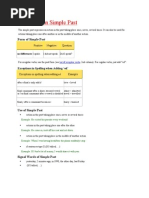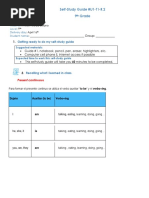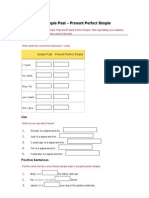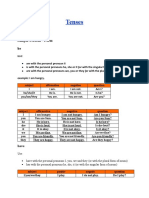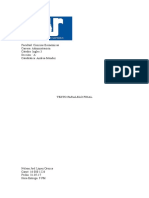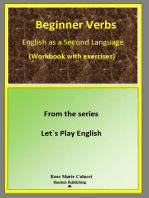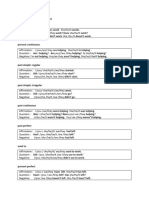Past Progressive (Past Continuous) : The Past Progressive Puts Emphasis On The Course of An Action in The Past
Past Progressive (Past Continuous) : The Past Progressive Puts Emphasis On The Course of An Action in The Past
Uploaded by
Hollman IbitoCopyright:
Available Formats
Past Progressive (Past Continuous) : The Past Progressive Puts Emphasis On The Course of An Action in The Past
Past Progressive (Past Continuous) : The Past Progressive Puts Emphasis On The Course of An Action in The Past
Uploaded by
Hollman IbitoOriginal Title
Copyright
Available Formats
Share this document
Did you find this document useful?
Is this content inappropriate?
Copyright:
Available Formats
Past Progressive (Past Continuous) : The Past Progressive Puts Emphasis On The Course of An Action in The Past
Past Progressive (Past Continuous) : The Past Progressive Puts Emphasis On The Course of An Action in The Past
Uploaded by
Hollman IbitoCopyright:
Available Formats
Past Progressive (Past Continuous)
The past progressive puts emphasis on the course of an action in the past.
Form
Positive Negative Question
I / he / she / it I was speaking. I was not speaking. Was I speaking?
you / we / they You were speaking. You were not speaking. Were you speaking?
Exceptions in Spelling
Exceptions in spelling when adding ing Example
final e is dropped (but: ee is not changed) come – coming
(but: agree – agreeing)
after a short, stressed vowel, the final consonant is doubled sit – sitting
l as final consonant after a vowel is doubled (in British English) travel – travelling
final ie becomes y lie – lying
Use of Past Progressive
puts emphasis on the course of an action in the past
Example: He was playing football.
two actions happening at the same time (in the past)
Example: While she was preparing dinner, he was washing the dishes.
action going on at a certain time in the past
Example: When I was having breakfast, the phone suddenly rang.
Signal Words of Past Progressive
when, while, as long as
Test on Past Progressive 1
Test
Write the ing form of the verbs.
1. live →
2. stay →
3. run →
4. win →
5. cycle →
Complete the table in past progressive.
positive negative question
It was raining.
They were not playing.
Was I listening?
Caron was not eating.
You were singing.
Was or Were?
1. We dancing.
2. The dog barking.
3. The printer printing out a photograph.
4. The pupils writing a test.
5. Sue and Gareth walking up the hill.
Write sentences in past progressive.
1. he / the car / wash →
2. she / home / go →
3. they / not / the match / watch →
4. you / in the shop / work →
5. I / not / a magazine / read →
Write questions in past progressive.
1. she / on a chair / sit →
2. you / your bag / pack →
3. his head / ache →
4. we / tea / drink →
5. you / the bike / repair →
Ask for the information in the bold part of the sentence.
1. Jamie was doing a language course in London. →
2. Andrew was carrying a heavy box. →
3. The teacher was testing our English. →
4. At six o'clock, we were having dinner. →
5. Sally was hurrying to school because she was late. →
Before submitting the test, check the following:
Got the spelling right?
Put in the full stop or question mark where required?
Used the correct key to type the apostrophe (Shift and #)?
In the test we cannot give you a second try. Such careless mistakes would therefore cost you
valuable points.
https://www.ego4u.com/en/cram-up/tests/past-progressive-1
You might also like
- Review and Check 11&12Document5 pagesReview and Check 11&12david04castillo2003No ratings yet
- ESL - English as a Second Language - Verbs: a QuickStudy Digital Reference GuideFrom EverandESL - English as a Second Language - Verbs: a QuickStudy Digital Reference GuideNo ratings yet
- PAST PROGRESSIVE - ExercisesDocument6 pagesPAST PROGRESSIVE - ExercisesJesús Alexander MejíazNo ratings yet
- Japanese Grammar Practice PDFDocument5 pagesJapanese Grammar Practice PDFRechel Soriano100% (1)
- Exercises On Simple PastDocument10 pagesExercises On Simple PastBhupinder ParmarNo ratings yet
- Test Your Knowledge On The Past ProgressiveDocument3 pagesTest Your Knowledge On The Past ProgressiveAna Filipa VazNo ratings yet
- InglesDocument2 pagesInglesMary HYNo ratings yet
- Support Handout For EnglishDocument20 pagesSupport Handout For EnglishLuis Julio Carlos PiresNo ratings yet
- Positive Negative: Exceptions in SpellingDocument5 pagesPositive Negative: Exceptions in SpellingCarla ChiroqueNo ratings yet
- The Past Progressive Tense - Formation, ExercisesDocument12 pagesThe Past Progressive Tense - Formation, ExercisesJane_Doe30No ratings yet
- Write The Ing Form of The Verbs.: Living Staying Running W Inning CyclingDocument2 pagesWrite The Ing Form of The Verbs.: Living Staying Running W Inning CyclingArnol L. Padilla CuadrdoNo ratings yet
- Self-Study Guide #U1-T1-R.2 9 Grade: - GroupDocument6 pagesSelf-Study Guide #U1-T1-R.2 9 Grade: - Groupnelson_rmontalvanNo ratings yet
- Negatives in The Past Progressive (Continuous) : Spelling TipDocument4 pagesNegatives in The Past Progressive (Continuous) : Spelling TipAnonymous dIuatXWYfyNo ratings yet
- Positive Negative: Write The Ing Form of The VerbsDocument2 pagesPositive Negative: Write The Ing Form of The VerbsAndres Felipe Suarez GualdronNo ratings yet
- Unit 4 - Top Notch 2 - Workshop UpdatedDocument8 pagesUnit 4 - Top Notch 2 - Workshop UpdatedSebas PérezNo ratings yet
- Test 6a Past ContinuousDocument1 pageTest 6a Past ContinuousCristina BariNo ratings yet
- Gold Exp 2e A2 GrammarFiles U3Document2 pagesGold Exp 2e A2 GrammarFiles U3Angelina KlymchukNo ratings yet
- Definition of The Simple Past TenseDocument7 pagesDefinition of The Simple Past TenseJhonatan MendozaNo ratings yet
- 2425 Material 2 Eso 1er Trimestre Ingle_s_compressed (1)Document59 pages2425 Material 2 Eso 1er Trimestre Ingle_s_compressed (1)alejandroelcofradeNo ratings yet
- Simple Past: Exceptions in Spelling When Adding Ed'Document3 pagesSimple Past: Exceptions in Spelling When Adding Ed'Aleksandra Sasha JovicNo ratings yet
- GRAMMAR Present SimpleDocument5 pagesGRAMMAR Present SimpleeugeneNo ratings yet
- Past Continuous SolDocument4 pagesPast Continuous SolLaxeNo ratings yet
- L As Final Consonant After A Vowel Is Doubled (In British English) Travel - TravellingDocument1 pageL As Final Consonant After A Vowel Is Doubled (In British English) Travel - Travellinghafizk16No ratings yet
- Test 6a Past ContinuousDocument1 pageTest 6a Past ContinuousMihaela Beatrice ConstantinescuNo ratings yet
- Name: Class: 6A Date: Test Paper (Test) Teacher: Mihaela PopaDocument1 pageName: Class: 6A Date: Test Paper (Test) Teacher: Mihaela PopaBaltag AdinaNo ratings yet
- English Class - Concepts by LuDocument17 pagesEnglish Class - Concepts by Lululuforero44No ratings yet
- Name: Class: Date: Test Paper (Test) : 1. Write The Ing Form of The VerbsDocument1 pageName: Class: Date: Test Paper (Test) : 1. Write The Ing Form of The VerbsandreeaNo ratings yet
- Auxiliary DidDocument10 pagesAuxiliary DidJesus RodriguezNo ratings yet
- Key Past ContinuousDocument3 pagesKey Past ContinuousDraganaNo ratings yet
- 16 TensesDocument35 pages16 TensesLouis Urano100% (1)
- Past Progressive (Past Continuous) : L As Final Consonant After A Vowel Is Doubled (In BritishDocument2 pagesPast Progressive (Past Continuous) : L As Final Consonant After A Vowel Is Doubled (In BritishLuisa Acevedo BuitragoNo ratings yet
- Copia de Actividad Semana 3 Grado SeptimoDocument4 pagesCopia de Actividad Semana 3 Grado SeptimoRichard Xavier100% (1)
- Pres Perf Simple Vs Past SimpleDocument1 pagePres Perf Simple Vs Past SimpleDANIELA CHIRITANo ratings yet
- English Test Simple PastDocument7 pagesEnglish Test Simple PastBernardo Pedral Sampaio ForraiNo ratings yet
- Verb Tense 1 SL PracticeDocument33 pagesVerb Tense 1 SL PracticecdivishyaNo ratings yet
- Form Positive Negative I / He / She / It I Was Speaking. You / We / They You Were Speaking. You Were Not Speaking. Were You Speaking?Document1 pageForm Positive Negative I / He / She / It I Was Speaking. You / We / They You Were Speaking. You Were Not Speaking. Were You Speaking?JuLiae AniNo ratings yet
- Past Simple and Continuous With ExerciseDocument7 pagesPast Simple and Continuous With ExerciseDonia ShadyNo ratings yet
- Session 1 English Tenses Theory and HomeworkDocument21 pagesSession 1 English Tenses Theory and HomeworkAlejandra RamosNo ratings yet
- Past Tense WorksheetDocument6 pagesPast Tense WorksheetEmanAbdel-HaqNo ratings yet
- Verb Tense Subject-Verb AgreementDocument13 pagesVerb Tense Subject-Verb AgreementLay C KangNo ratings yet
- Present and Past ContinuousDocument3 pagesPresent and Past ContinuousJonas Dos SantosNo ratings yet
- Tenses: Simple PresentDocument4 pagesTenses: Simple PresentchristoffelalexanderNo ratings yet
- Noun Clauses and Reported SpeechDocument32 pagesNoun Clauses and Reported Speech2357011092No ratings yet
- Past Progressive-ContinouosDocument19 pagesPast Progressive-ContinouosHenry Slate SteeleNo ratings yet
- Simple Past TenseDocument10 pagesSimple Past Tensefaiza marzoukNo ratings yet
- University of Panama Vicepresidency of Research and Graduate Studies College of Humanities English DepartmentDocument28 pagesUniversity of Panama Vicepresidency of Research and Graduate Studies College of Humanities English DepartmentlingarajugowdaNo ratings yet
- TEACHER: Jesus Javier Cobeñas Morales.: Life, Second EditionDocument5 pagesTEACHER: Jesus Javier Cobeñas Morales.: Life, Second EditionJhon Calle VasquezNo ratings yet
- Verb TensesDocument14 pagesVerb Tensesibenkem1234No ratings yet
- Ingles 4to T.M Clase 6.trabajo IntegradorDocument9 pagesIngles 4to T.M Clase 6.trabajo IntegradorMayra Aleja Quintero ValenciaNo ratings yet
- Unit 4 Business TerminologyDocument13 pagesUnit 4 Business TerminologyDiana Patricia Soto OsorioNo ratings yet
- Tenses CamilaDocument12 pagesTenses CamilaWanda FernandezNo ratings yet
- Past Continous Tense BsiDocument6 pagesPast Continous Tense BsiAgya RizqaNo ratings yet
- Past ProgressiveDocument1 pagePast ProgressivetorbenteacherNo ratings yet
- Institución Educativa San Mateo Guía de Trabajo en Casa: (Una Semana)Document6 pagesInstitución Educativa San Mateo Guía de Trabajo en Casa: (Una Semana)Saray AcuñaNo ratings yet
- Nelson Joel Lopez Orozco 16 000 1226Document29 pagesNelson Joel Lopez Orozco 16 000 1226LN NLNo ratings yet
- 20 Inglés IiDocument21 pages20 Inglés IiChava SanchezNo ratings yet
- Past Continuous. Test Write The Ing Form of The Verbs.: 1. Live 2. Stay 3. RunDocument3 pagesPast Continuous. Test Write The Ing Form of The Verbs.: 1. Live 2. Stay 3. Runandrutzas71No ratings yet
- Grammar Reference With Practice Exercises: Unit 5Document1 pageGrammar Reference With Practice Exercises: Unit 5Frankin C. Tovar MendozaNo ratings yet
- Simple Present Tense PPTDocument23 pagesSimple Present Tense PPTpujialmansyurNo ratings yet
- Simple Present TenseDocument23 pagesSimple Present TenseMaria Alice Inácio de SouzaNo ratings yet
- Present Perfect ContinuousDocument2 pagesPresent Perfect ContinuousNesreen WalledNo ratings yet
- PIA - Model MillionaireDocument2 pagesPIA - Model MillionaireFiorella Panizza (Miss Fiore)No ratings yet
- Alfredo InglesDocument11 pagesAlfredo InglesAlegria Daniel Agostinho100% (1)
- Course Structure - Sem 1 and 2Document1 pageCourse Structure - Sem 1 and 2Nikita SharmaNo ratings yet
- E11 Matrix StudentsDocument1 pageE11 Matrix Studentstranngohuyhoang.nkNo ratings yet
- Phonology Assignment: Australian English PronunciationDocument11 pagesPhonology Assignment: Australian English PronunciationSeoultan RabbaniNo ratings yet
- Reported Speech - DavidDocument2 pagesReported Speech - DavidNerea González SoutoNo ratings yet
- Snake and ApeDocument8 pagesSnake and ApeMary AnnNo ratings yet
- First ConditionalDocument2 pagesFirst ConditionalМарія КозакNo ratings yet
- 2018 Subrouping of The Semitic LanguagesDocument2 pages2018 Subrouping of The Semitic LanguagesStefan Mihajlovic100% (1)
- AkhkjctiveKorean1 WghrdtgfjyB SampleDocument28 pagesAkhkjctiveKorean1 WghrdtgfjyB Samplemaster nanoNo ratings yet
- Tabla Tiempos VerbalesDocument2 pagesTabla Tiempos VerbalesacademiawonderenglishNo ratings yet
- Diagnostic Evaluation - Attempt ReviewDocument36 pagesDiagnostic Evaluation - Attempt ReviewNelfrydariel Cruzgenao100% (1)
- GeneratedPreferences 3410018052 07022024102214Document5 pagesGeneratedPreferences 3410018052 07022024102214qajjeplNo ratings yet
- 7.2 Grade 7 EFAL Curriculum Coverage Tool Term 4 2022Document2 pages7.2 Grade 7 EFAL Curriculum Coverage Tool Term 4 2022Nthabi TyobekaNo ratings yet
- English TensesDocument2 pagesEnglish Tenseslisa rouxNo ratings yet
- Japanese Grammar of Verbs For JLPT N5 - NIHONGO ICHIBANDocument7 pagesJapanese Grammar of Verbs For JLPT N5 - NIHONGO ICHIBANジョンナ メイ ハイミNo ratings yet
- Passive VoiceDocument1 pagePassive VoiceAhmad RomadhonNo ratings yet
- Transformation of SentenceDocument1 pageTransformation of Sentencemnpappu1994No ratings yet
- Longman Intro 1 - 002Document1 pageLongman Intro 1 - 002Mak JaniNo ratings yet
- 보건복지사이버평생교육원 www.bbedu.co.krDocument112 pages보건복지사이버평생교육원 www.bbedu.co.krabi kangNo ratings yet
- Present Perfect Continous TenseDocument9 pagesPresent Perfect Continous TenseFel FellyNo ratings yet
- Pretérito Perfecto Simple o Pretérito IndefinidoDocument3 pagesPretérito Perfecto Simple o Pretérito IndefinidoHarumi GonzálezNo ratings yet
- Advance Spanish Past, Present Progressive Form and Past ParticipleDocument6 pagesAdvance Spanish Past, Present Progressive Form and Past ParticipleKevs Pimentel VillanuevaNo ratings yet
- A Letter Present Simple or Contionuous Grammar Drills Reading Comprehension Exercises Tes - 76626Document1 pageA Letter Present Simple or Contionuous Grammar Drills Reading Comprehension Exercises Tes - 76626romina acostaNo ratings yet
- Course Syllabus LT5001 (2023 Sem 1)Document2 pagesCourse Syllabus LT5001 (2023 Sem 1)fungklNo ratings yet
- Focus3 2E Grammar Quiz Unit8 2 GroupBDocument1 pageFocus3 2E Grammar Quiz Unit8 2 GroupBIvannaNo ratings yet
- Stress InterchangeDocument2 pagesStress InterchangeДарья БарановаNo ratings yet




